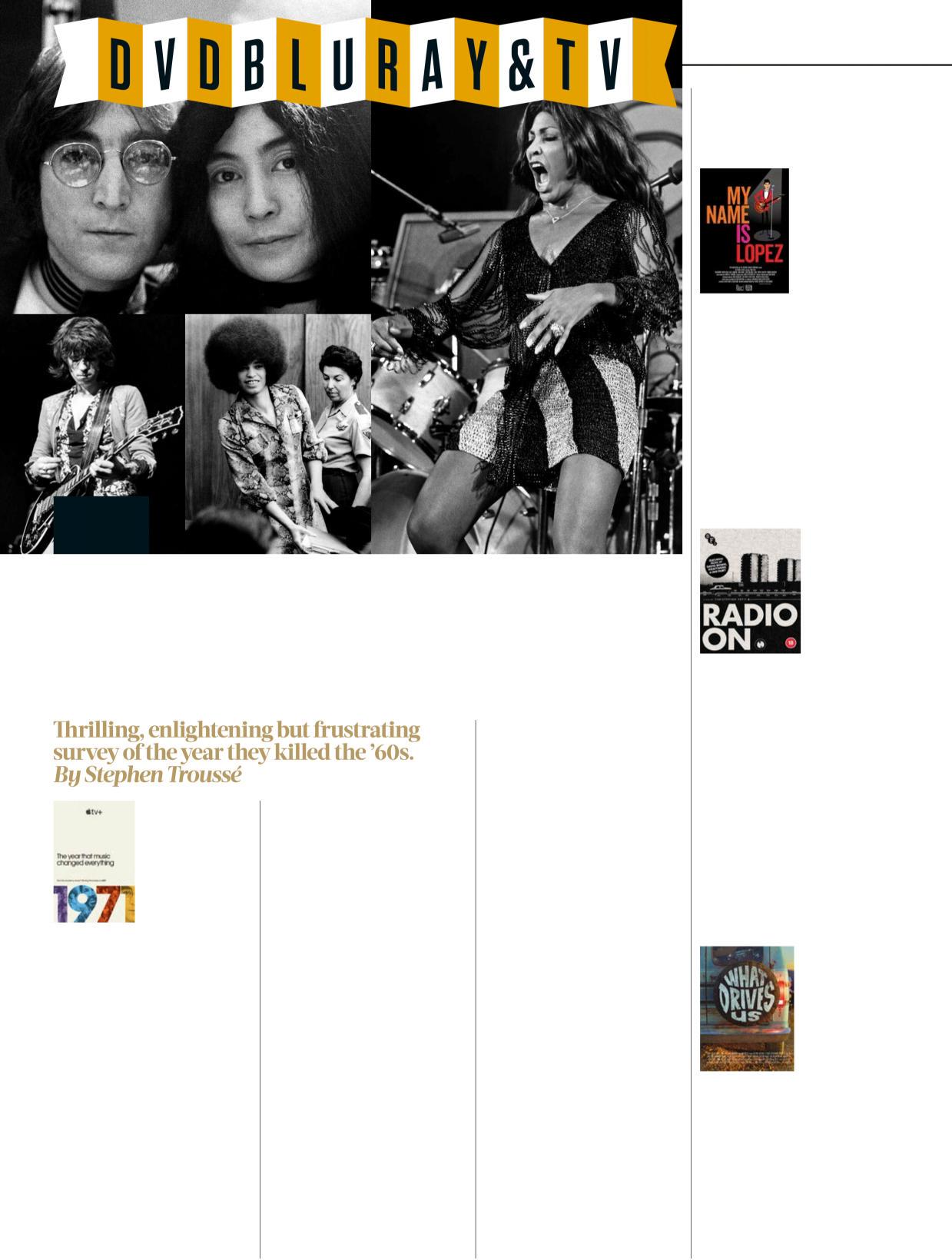
4 minute read
DVD, Blu-ray and TV
from Kutucnu_0721
by aquiaqui33
C/wise from top left: John & Yoko, TIna Turner, Angela Davis and Keith Richards
1971:THEYEARTHATMUSIC CHANGED EVERYTHING
Advertisement
APPLE TV+
7/10
RIGHTnowyou can fnd a whole bookshelf of pop histories eager to contend that any year from 1966 to 1984 was the one true year when rock, soul, punk or pop changed the world forever. On the face of it, David Hepworth’s 1971: Never A Dull Moment might be the most plausible of these: it’s hard to dispute the glory of 12 months that gave us Blue, What’s Going On, Hunky Dory, Tapestry, Electric Warrior, Tago Mago, Maggot Brain and There’s A Riot Goin’ On – to name but a few.
Apple’s new eight-part documentary builds on Hepworth’s premise but with a keener sense of how the music was embroiled in the roiling currents of history: Vietnam, civil rights, Black Power, feminism and LGBT+ liberation, the Cold War and technological change.
It’s a relentless cavalcade of astonishing material: from John Lennon giving a preview of “Imagine” in his Ascot mansion before getting an update from Tariq Ali on the geopolitics of Pakistan to a young girl literally biting a lock of hair from the head of Marc Bolan; from David Bowie debuting a shaky “Changes” as dawn rises over Glastonbury to Tina Turner, imperiously singing back to Ike on “I Smell Trouble”.
It feels churlish, then, to have reservations. Nevertheless, a lot of 1971 falls frustratingly between stools, unsure if it’s a compelling episode of the old BBC show The Rock’n’Roll Years or a particularly overwhelming Adam Curtis doc. By lacking a clear narrative line or critical point of view, and grouping madly disparate events into broadly thematic episodes, it lacks focus and risks tokenism.
If you’re mainly interested in the music, you might be bored or bewildered by the extended focus on the pioneering PBS documentary An American Family or the Oz court case. If you’re keen to know more about the Black Power movements, or how musicians were informed (or not) by feminism, you might feel short-changed by attempts to tie these issues up in a couple of 45-minute episodes (in truth each of these might be subjects for richer, more focused series of their own).
As an Uncut reader, you may fnd much of it overfamiliar: original interviews are scarce and there’s an abundance of old stories: Joni in Laurel Canyon, Elton at the Troubador, Bowie meeting Warhol, the Stones at Nellcôte. With a few exceptions, the series skirts anything too proggy or non-anglophone – no Yes, Serge Gainsbourg or Fela Kuti, each of whom had remarkable 1971s.
But at its best, the series reminds you of the long histories of modern questions. “We were creating the 21st century in 1971,” says Bowie – and at times the show comes close to suggesting that between them, Bowie, Lennon and Pete Townshend pretty much invented modern pop, politics and the internet – not to mention Billie Eilish. But, most powerfully in Aretha Franklin’s magnifcent “Bridge Over Troubled Water” at the Apollo in the wake of the Attica Prison uprising, it reminds us we haven’t come far enough.
EBERSOLE HUGHES
7/10 HonoraryRatPackerremembered
Hardly an Uncut core artist – the only previous occasion Trini Lopez’s name has graced these pages was a brief obituary last year – but this award-winning doc about the Tex-Mex singer championed by Sinatra and who hit No 1 in 1963 with “If I Had A Hammer” makes for compelling viewing. Archive footage, interviews with Lopez before his death from Covid-19 and tributes from Billy Gibbons, Dave Grohl and more are smartly spliced together to tell a lesserknown story that deserves to be heard.
NIGEL WILLIAMSON
RADIO ON
BFI
8/10 AveryEnglishroadmovie
Chris Petit’s lonely road movie follows DJ (David Beames) as he drives from London to Bristol in 1979 afer the death of his brother. It’s an inaction movie, with gorgeous monochrome photography from Wim Wenders’ cameraman Martin Schäfer. The windscreen is rain-spattered, the architecture austere. The soundtrack is futuristic (Bowie, Krafwerk) and contemporary (Ian Dury, Wreckless Eric). Even a turn by Sting can’t puncture the mood of dislocation. Extras: 8/10. Interviews, digital remix by Wire’s Bruce Gilbert, shorts, including one directed by Viv Albertine.
ALASTAIR McKAY
WHAT DRIVES US
CODA COLLECTION
8/10 Rockstars’odetoroad-wornchariot
Dave Grohl narrates this lovely paean to the most basic – and usually much maligned – tool of the touring musician’s life: the van. While few of Grohl’s interviewees – which include Slash, St Vincent, The Edge, Lars Ulrich, Ringo Starr and Brian Johnson – are any longer obliged to crowd into a backfring Transit to play unglamorous support gigs to three people in Scunthorpe, their origin stories are fascinating and ofen ruefully funny, and the insights into what possesses someone to hit the road ofen moving. A simple idea, brilliantly realised.






